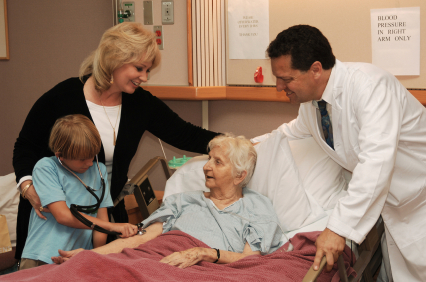 Elder patient advocacy is a topic considered by many older patients as they age. It can be difficult to understand medical problems and all possible treatment options, especially when coping with memory loss through Alzheimer’s disease. An elder patient advocate can be selected to help the patient understand his or her medical options. This enables the elderly patient to attain an improved level of care.
Elder patient advocacy is a topic considered by many older patients as they age. It can be difficult to understand medical problems and all possible treatment options, especially when coping with memory loss through Alzheimer’s disease. An elder patient advocate can be selected to help the patient understand his or her medical options. This enables the elderly patient to attain an improved level of care.
Qualified Patient Advocates
A qualified elder patient advocate will have a background in the medical industry. Many times, an elder patient is able to hire an advocate who has a medical background in the specific field of medicine that is most relevant to the patient. For example, an elderly Alzheimer’s patient who is seeking an advocate could benefit the most from hiring a person with previous experience in dealing with forms of dementia.
Many Registered Nurses (RNs) become patient advocates during the later years of their career. This ensures that the person has the skills needed for excellent patient advocacy. A Registered Nurse typically has experience with a variety of health conditions and management needs.
Some elderly patients elect to assign a family member to the role of patient advocate. While the elder patient may feel comforted by knowing the advocate personally, it may not be the best decision from a medical standpoint. Unless that family member is experienced with medicine or elder patient advocacy, the family member may have difficulty guiding the elderly patient to make the right health decisions.
Selecting an Elder Advocate
The process to selecting an elderly patient’s advocate should include a series of steps and questions, including:
- Is the potential patient advocate someone who is trusted by the elderly person?
- Is the patient advocate an effective and assertive communicator?
- Does the elder patient advocate have a background in health care? Does the elderly patient feel more comfortable with selecting a family member as an advocate, or would the patient prefer an advocate with a medical background? Many adult care facilities have suggestions of patient advocates that they have previously worked with.
- Decide where help is needed and what the elderly patient would prefer to do alone.
– Will the elder patient advocate collect, research, and investigate various health conditions or treatment options?
– Will the elder patient advocate interact directly with doctors, hospitals, and other medical professionals, regardless of whether or not the elderly patient is present at the time?
– Will the patient advocate accompany the elder to tests, appointments, and other medical procedures?
– Will the elder patient advocate assist in writing down all information that is received from caregivers?
– Will the elder patient advocate play a role in communicating health conditions to the patient’s family?
– Will the patient advocate ensure that the elder patients’ wishes are carried through, even if the patient is unable to do so personally?
- Be clear with the elder patient advocated regarding how assistance is needed and what matters will be dealt with personally.
- Communicate with physicians, nurses, caregivers, pharmacies, and loved ones regarding the new elder patient advocate. Promptly communicate any changes to the patient advocacy arrangement, as they arise.
- Ensure that all medical professionals and immediate family members are able to get in touch with the patient advocate. In the event of an emergency, the elder patient advocate will need to alert loved ones and any relevant caregivers.
Elder Advocacy Abuse
In rare cases, an elder patient advocate may abuse his or her privileges. This happens most often when the elderly patient does not have much social interaction or contact with loved ones. Elderly patients coping with dementia, such as Alzheimer’s disease, are also at heightened risk of elder advocacy abuse.
The elderly patient advocate may act out of negligence, supporting the patient with ill-formed decisions and guidance without the intention of harm. In some cases, the elder’s advocate may take advantage of access to the elder’s financial resources or health insurance. This implies intentional harm. As a result, the elderly patient may not receive adequate medical care.
When selecting an elderly patient advocate, to avoid advocacy abuse, it is important to research the patient advocate’s references and qualifications. If the elderly patient knows the advocate personally, then care must be taken to ensure the patient advocate is trustworthy and reliable. The biggest responsibility of an elder patient advocate is to be readily available, to advocate for the patient’s best interest while minimizing the anxiety an elderly patient may feel.
Sources:
Knox, Richard. “Advocates Help Patients Navigate Health Care Maze.” NPR. (2009): n. page. Web. 25 May 2013. http://www.npr.org/templates/story/story.php?storyId=105161828
“Patient Advocacy: Voice for the Elderly and Disabled.” IKOR USA. N.p., n.d. Web. 25 May 2013. http://www.ikorusa.com/PatientAdvocacy.html
“Role of the Patient Advocate: A Consumer Fact Sheet.” National Patient Safety Foundation. N.p., n.d. Web. 25 May 2013. http://www.npsf.org/for-patients-consumers/tools-and-resources-for-patients-and-consumers/role-of-the-patient-advocate/
“Senior Services.” Patient Advocate Foundation. N.p., n.d. Web. 23 May 2013. http://www.patientadvocate.org/resources.php?p=479
